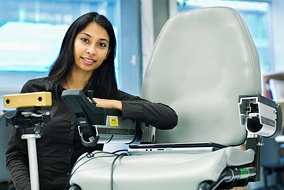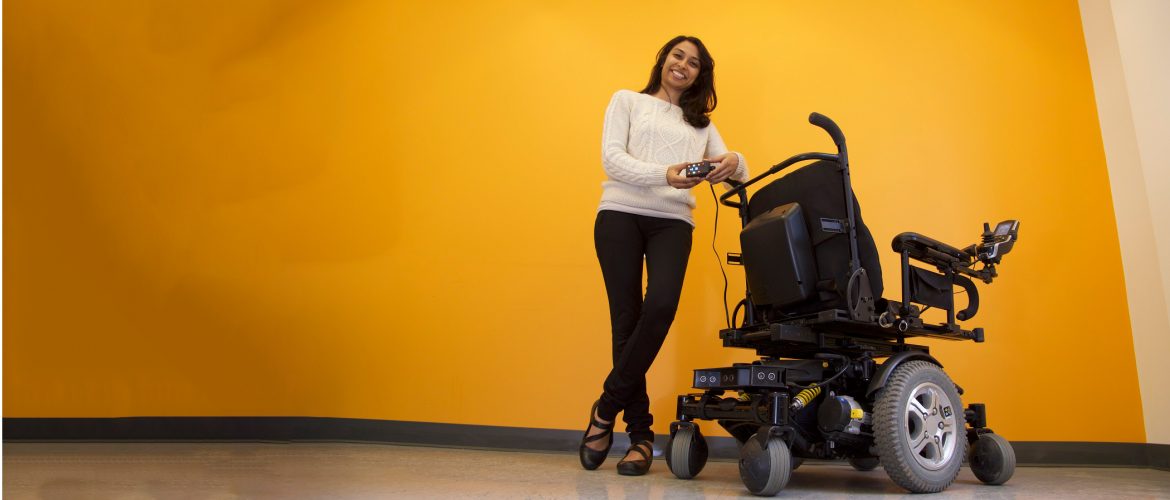Canadian startup Braze Mobility has disrupted the healthtech market by creating the first-ever smart wheelchair sensor system. The sensors help users navigate their world by providing audio, visual and vibration feedback when obstacles are nearby. Since launching in 2016, the company has made waves in the aging and brain health world as an evidenced-based solution providing individuals with mobility impairment a chance to regain mobile independence, something CEO and Founder Pooja Viswanathan says is vital for quality of life and well-being.
We spoke with Viswanathan about her journey as an entrepreneur and the lessons she’s learned in bringing her innovation, which began as a research prototype, to market. As a participant of CABHI’s MC² Market Readiness Program – a program for healthtech companies whose solutions improve the lives of aging adults – Viswanathan also shares what she’s most excited about when it comes to the future of her company.
Q: Can you describe your journey from researcher to entrepreneur?
A: I would often see residents in long-term care facilities hunched over in manual wheelchairs because they didn’t have the strength to self-propel. They weren’t given powered wheelchairs because of the safety concerns – many of them had vision and/or cognitive impairments that would make it challenging to navigate a powered device. Instead, they had to rely on caregivers to push them around, which prohibited their independence and sense of autonomy.
As a tech developer I created a proof of concept showing that smart technology could improve independence and mobility in wheelchair users with cognitive challenges. When I began getting requests from people who wanted to buy the system for their loved ones, I knew I had to make my research prototype more widely available.
Q: How does your wheelchair sensor improve the lives of older adults?
 A: When you’re in a chair all the time it’s hard to see what’s around you. Our sensors are retrofit, so they can be used on any wheelchair – manual or powered. They detect obstacles and provide feedback to the user on both the location and proximity of objects through lights, sound, and vibration. There’s already so much stigma about not being able to drive a wheelchair properly – which isn’t fair to say because it’s actually very hard to do. Our sensors provide an opportunity to raise awareness about the issues wheelchair users face so they can know they’re not alone.
A: When you’re in a chair all the time it’s hard to see what’s around you. Our sensors are retrofit, so they can be used on any wheelchair – manual or powered. They detect obstacles and provide feedback to the user on both the location and proximity of objects through lights, sound, and vibration. There’s already so much stigma about not being able to drive a wheelchair properly – which isn’t fair to say because it’s actually very hard to do. Our sensors provide an opportunity to raise awareness about the issues wheelchair users face so they can know they’re not alone.
Q: What’s been the key driver in your success so far?
A: I would say knowing when a product is actually good and when it solves the problem you set out to address. A huge part in knowing the answers to these questions is staying close to your end-user. It’s your end-users that will tell you what their problem is and how to solve it. CABHI’s investment in us was also very timely, as we needed to expand our team to support the growing demand for our product. We also gained new mentors and advisors through their network to help us scale.
Q: What advice would you give other researchers looking to develop healthcare technology?
A: Have formal and informal conversations with your end-users. Leave space for building rapport and relationships and creating a safe space for people to be heard. When I started to get to know my end-users outside of being a researcher, I realized I was creating a safe space and an environment where we could collaborate.
Oftentimes, there is an unbalanced power dynamic where the researcher is the owner and decision-maker in the project. We flipped that model around when we did our beta tests. Our beta clients were paying us to use our products. Because of that they had skin in the game and were more likely to give us critical feedback.
Q: What’s next for Braze Mobility?
A: One thing we’re really excited about is working with CABHI to grow in the post-acute market through their MC² Market Readiness Program. We don’t have a lot of knowledge in this area, but we know there is a need. We’re excited to have CABHI help us strategize on how we can better serve people who are in rehab, LTCs and assisted living. We’re also excited about expanding into foreign markets. So far, we’ve received a lot of traction in North America. Now we’re approved by some of the largest dealers in the US and Canada that have over 70% of market share, and over 700 representatives across both countries. We continue to grow and are currently negotiating with wheelchair manufacturers to create a system that will become standard in powered wheelchairs.
To learn more about Braze Mobility, visit their website: www.brazemobility.com
* This interview has been edited for clarity and length


